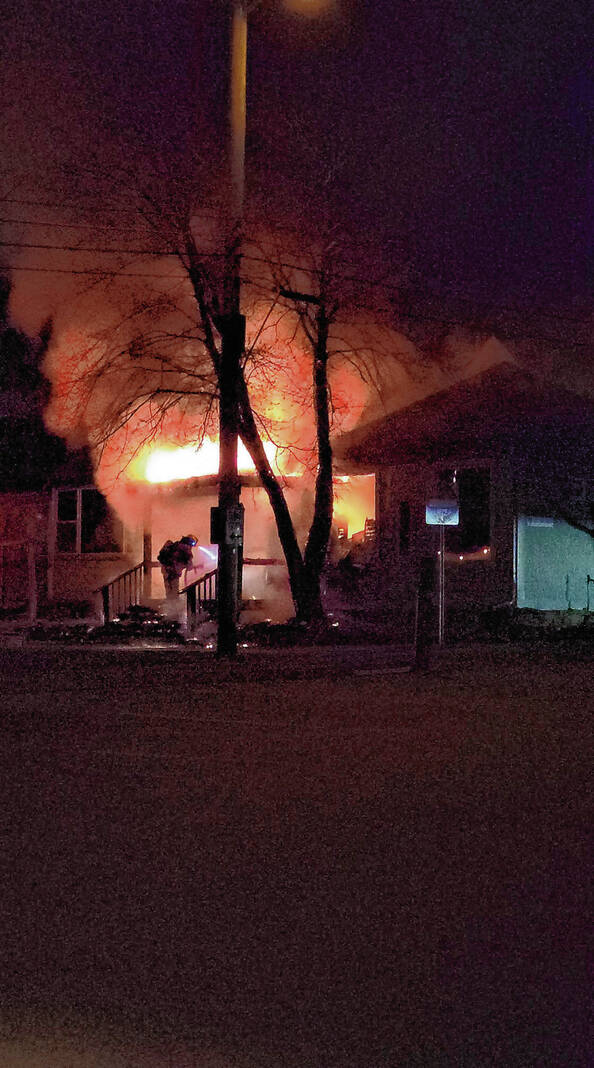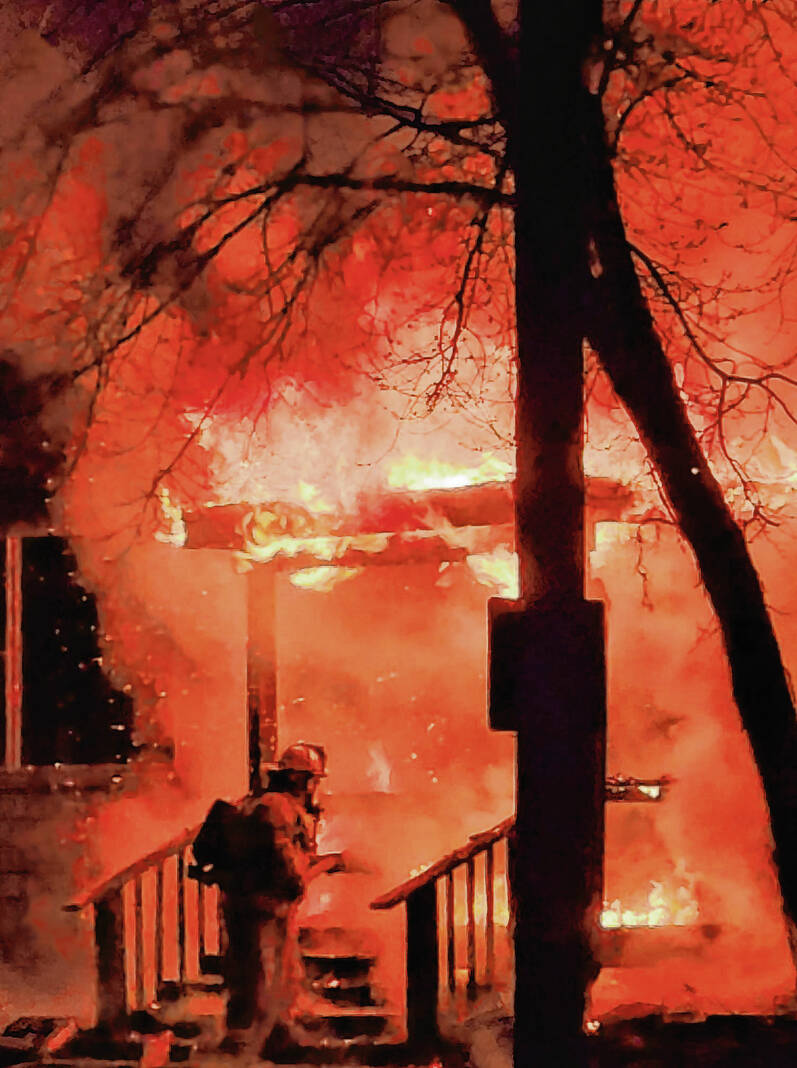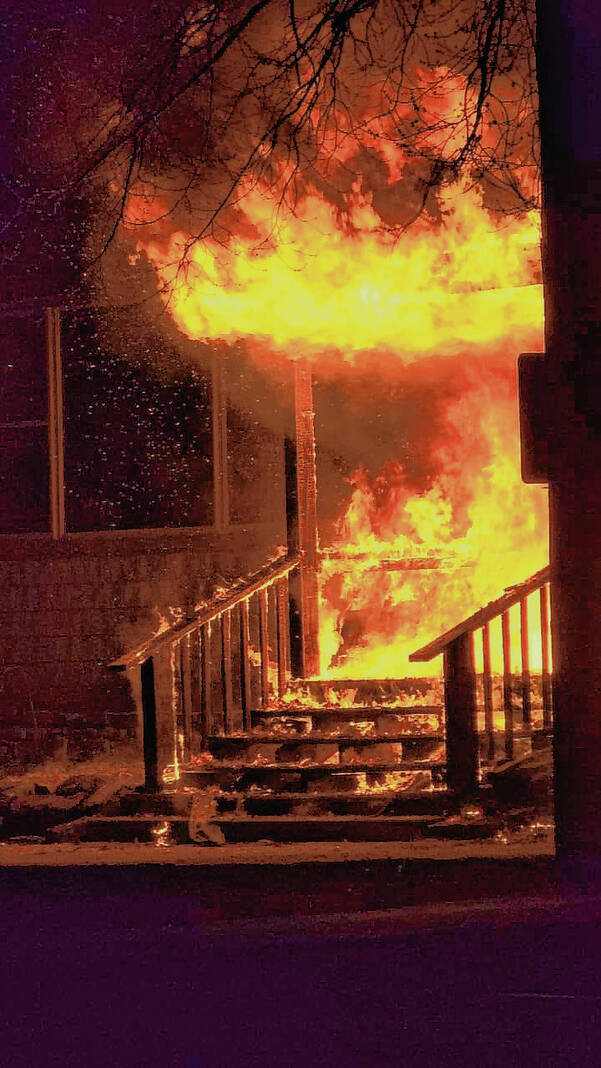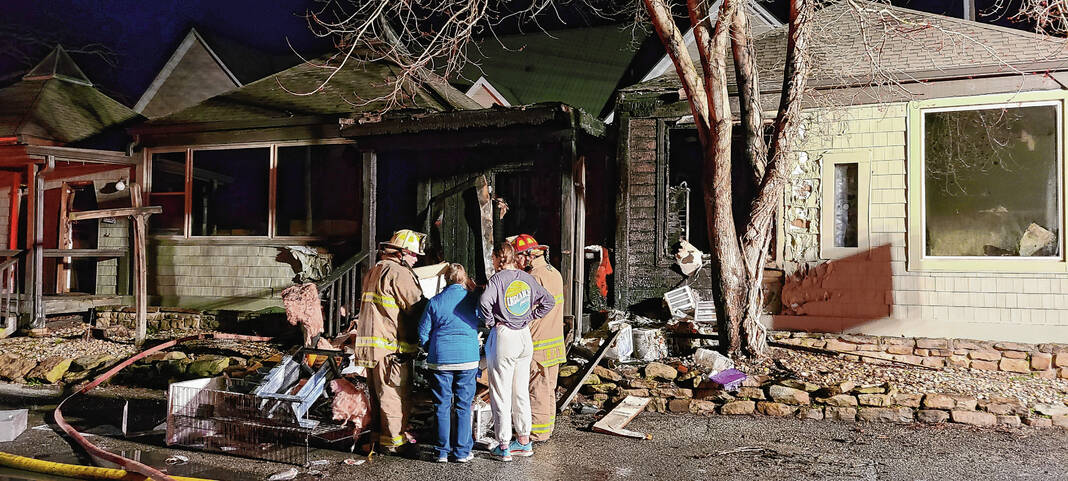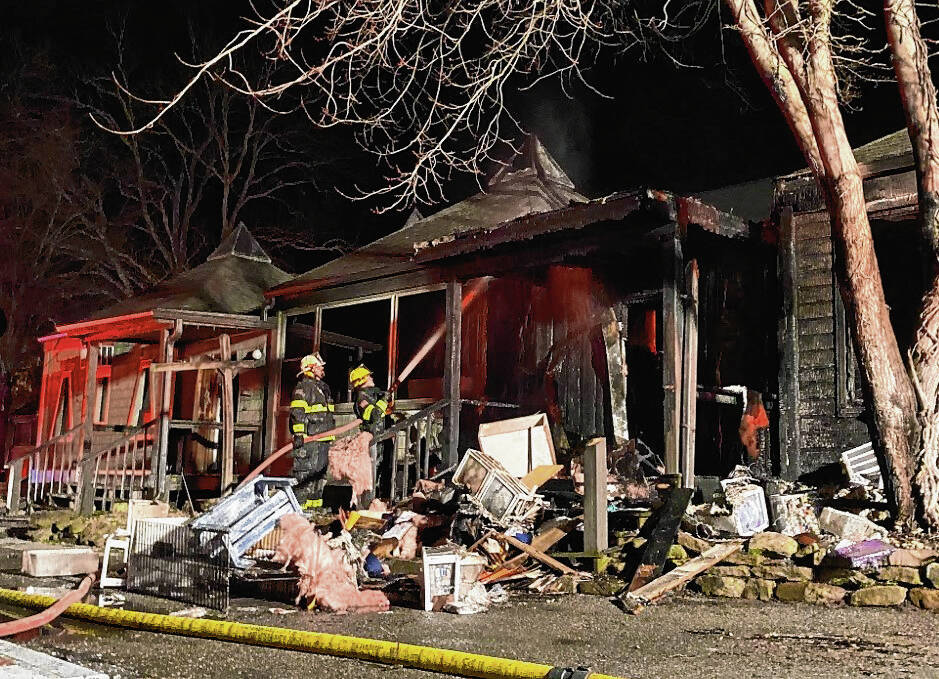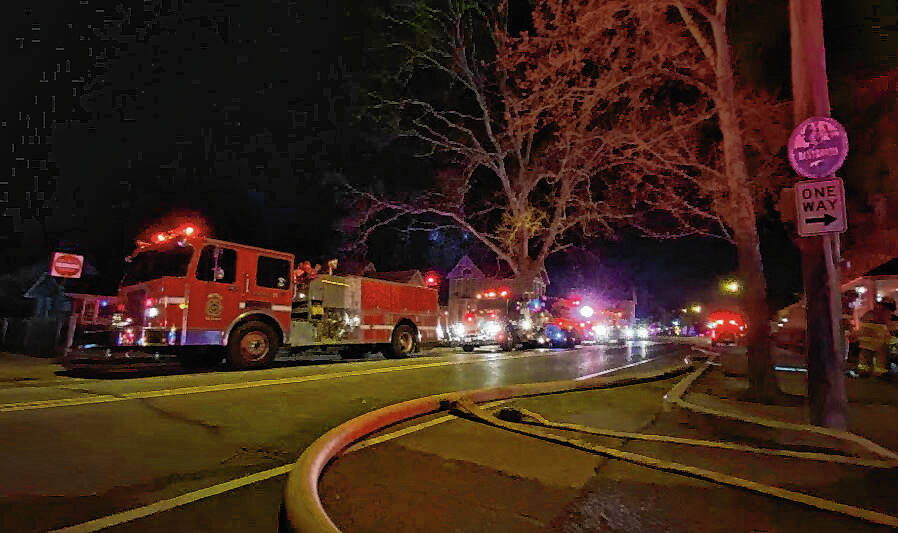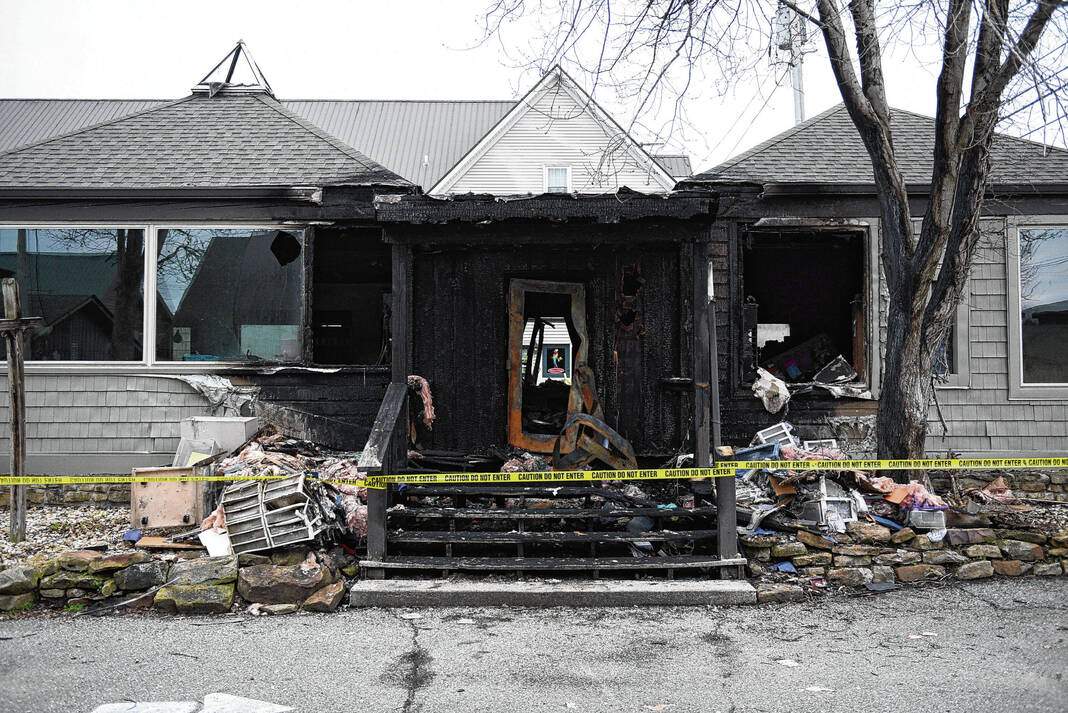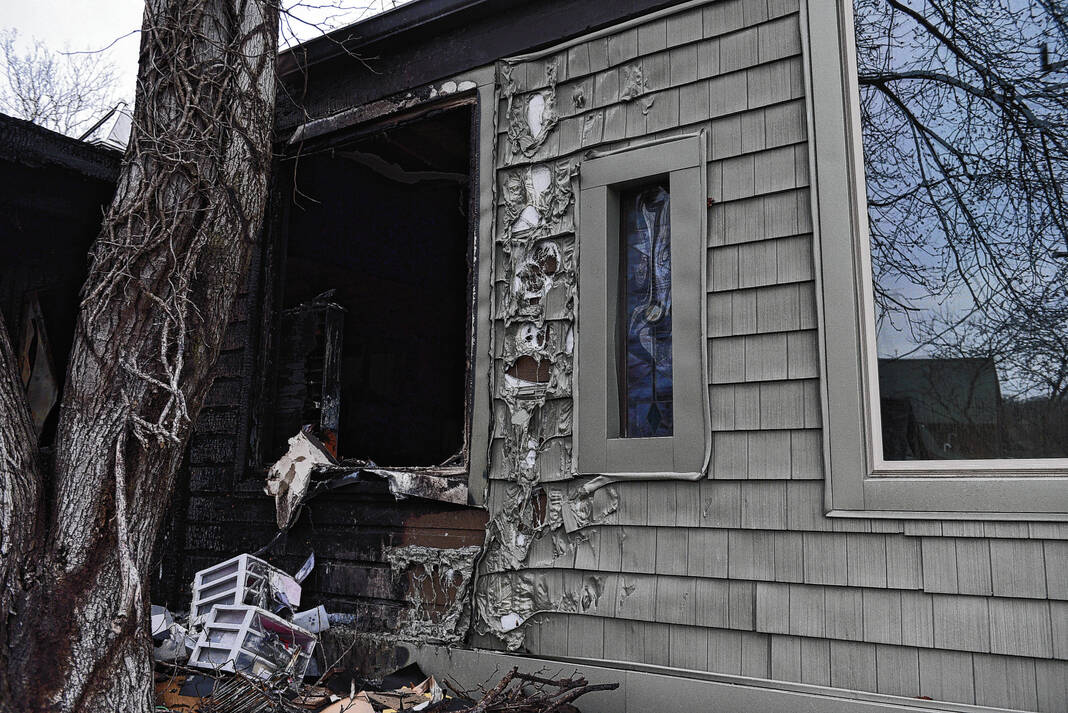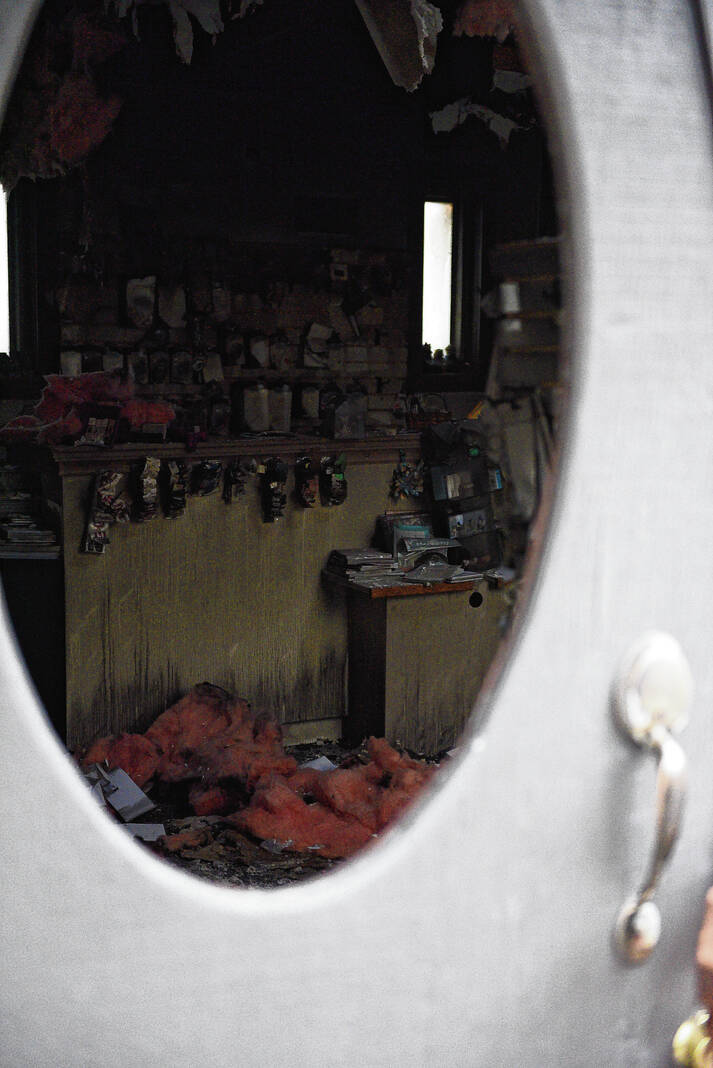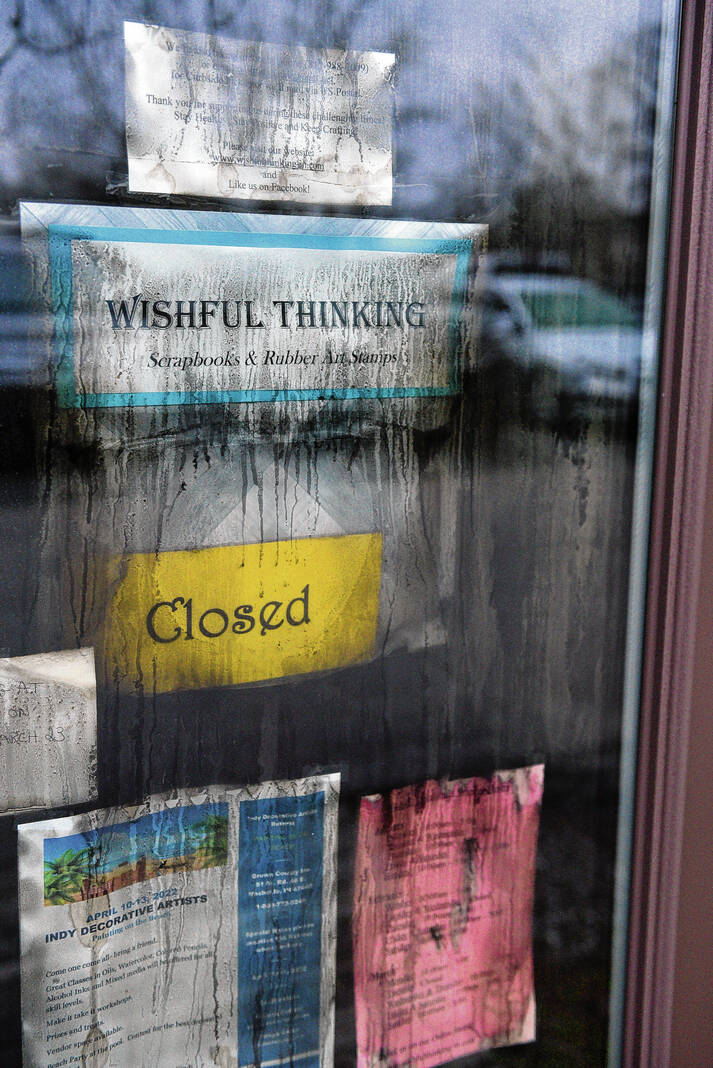Lights, smoke and sirens flooded the cool night air as firefighters battled a blaze in downtown Nashville, working to keep it from spreading to other nearby buildings.
Flames erupted from the porch of Wishful Thinking, a scrapbooking and craft supply shop at Old School Way and Pittman House Lane in the Back-to-Back complex.
Five out of six Brown County volunteer fire departments responded to the fire that was called in around 9:30 p.m. on March 21.
Both ends of Van Buren Street in Nashville were blocked by Brown County Sheriff’s Department vehicles as nearly a dozen fire department vehicles lined the street between Nashville Christian Church and the Brown County Playhouse.
The blockade did not stop the curiosity and concern of locals who arrive don foot to catch a glimpse of the scene in their jackets and pajamas, phones in hand capturing the blaze and lights of emergency vehicles.
About an hour and a half later the flames were extinguished.
The town was lucky, once again.
Since then, community conversations about fire department support and funding have been brought to the forefront once again.
The last time these conversations — and a similar scene — happened was when the Carmel Corn Cottage caught fire in September 2020.
The Back-to-Back complex is home to three other businesses, one being Simply 4 You, which is adjacent to Wishful Thinking. That shop also had damage from flames, heat and smoke. The other two shops were unscathed.
The owner of Wishful Thinking, as well as owners of surrounding shops, were at the scene assessing the situation and waiting for updates from the fire department on their businesses.
When reached for comment, the owner of Wishful Thinking thanked the local fire department and said that it was an emotional time, not commenting further.
The cause of the fire is undetermined at this time.
Even though one business suffered a total loss, Brown County (Nashville) Volunteer Fire Department Chief Nick Kelp said it could have been a lot worse.
NVFD had a crew of about six or seven who just so happened to be doing maintenance at the station on Main Street when the call came in.
Kelp said that sped up their response time by about ten minutes.
With fire doubling in size every minute, he said it’s not inconceivable to think more than one shop could have been lost by it spreading to other shops in that complex, across Pittman House Lane and to the adjacent Artist Colony shops including the Artist Colony Inn and Restaurant where guests were staying.
“I consider it lucky,” he said.
‘Horrifying and scary’
Brown County Emergency Management Agency Director Susan Armstrong was at the scene of the fire and said that when a shop is destroyed by fire in Nashville, it is scary to think about the extensive damage it could do.
The proximity of businesses and homes in the village district is something they address in emergency trainings, Armstrong said.
“The buildings are so close in Nashville that you really have to be careful,” she said. “We have to have enough firefighters on the scene to not just manage the fire, but to get water on those close buildings so that one of them does not catch on fire from the heat and the flames jumping over to it.”
This isn’t the first time these concerns and fears have come up. The last fire downtown was about a year and a half ago, when the Carmel Corn Cottage was destroyed by an electrical fire.
Conversations of fire department manpower and funding took center stage after the Carmel Corn Cottage fire.
Around 20 volunteers from three departments responded to that incident, as well as an off-duty firefighter from Greenwood who happened to be in town at the time.
Kelp said at the time that if that call had come in a couple hours earlier when those volunteers were still at work, the outcome could have been much different.
“They are just so close together,” Armstrong said of shops in Nashville.
Not only is it a concern for retail businesses, with merchandise and outdoor decor that is flammable, but it’s a concern for possible overnight and apartment rentals located above these businesses.
Armstrong said she feels horrible for the shop owners, but was grateful that first responders were able to be on scene quickly and keep it from spreading.
“By the time I was alerted the fire was even happening they were already en route over there,” she said. “It was very quick. That saved it from being a much bigger issue.”
Nashville Town Council President Nancy Crocker lives in town and received a text from someone asking if she knew what the sirens were for in town.
She made her way to Old School Way and spoke with first responders, business owners and other individuals at the scene. She said what she witnessed there was “horrifying and scary.”
She also counts the town lucky.
“We’re very lucky that, one, it wasn’t a windy night, and two, the fire department was at the station,” she said. “Had we not had those two things in our favor we would have lost a lot more buildings.”
She said she plans to revisit the idea of establishing a fire territory again.
“We were warned with the Carmel Corn Cottage, now we’ve been warned twice,” she said. “If the wind had been blowing and the firefighters weren’t at the station, it could have been the whole block.”
Low funds, dwindling volunteers
The town raised the fire department’s contract to $20,000 from $17,000 in 2021. This year’s budget is the same.
Kelp said last month at a Nashville Town Council town hall discussion meeting about public safety that cost covers their insurance and some fuel.
“We don’t have money for (the department),” Crocker said. “Not enough.”
In addition to the funding they receive from the town, the department has a $40,000 contract with Washington Township for fire protection.
The town council directs a portion of property taxes into a cumulative capital development fund for the fire department, which builds up over time for larger items like buildings and equipment.
The town council hasn’t been able to add any new fire tax on its own because it is at its levy limit.
Since 2014, three different Nashville fire chiefs have come before the town council asking for more help — namely, a mechanism by which to pay firefighters so that volunteers aren’t all they have to rely on.
In 2014, the fire department and the Washington Township Advisory Board attempted to get an emergency fire loan that would have raised taxes on township residents, but not Nashville residents, for three years. It would have meant an extra 13 cents per $100 of assessed property value, or $130 on a $100,000 property.
That would have brought in up to $975,000 for the Nashville fire department, but the outgoing township trustee at the time said that all the department would borrow immediately would be $325,000 for one year, with the next trustee to continue it if desired.
The $325,000 would have been able to fund the salaries of three full-time firefighters and some part-time help, who would have been at the station on weekdays during business hours. Volunteers also would have been used.
The Indiana Department of Local Government Finance shut down that effort after 11 taxpayers petitioned against it. The DLGF mentioned concerns about inequitable taxation in its opinion, since more than just Washington Township residents would have benefited from the service, but only they would have paid for it.
The Brown County Council, in a 4-3 vote in 2014, also did not support that effort.
In 2016, the fire department gained the support of the Nashville Town Council and Washington Township Advisory Board to try to form a fire territory. That’s a new unit of government that could levy a new tax on property owners in those areas.
In 2016, the additional tax was estimated at 8 cents per $100 of assessed property value, or $60 to $80 extra per year on a $100,000 property, for all of Washington Township and Nashville.
To form a territory, though, the Brown County Commissioners would have had to allow Washington Township to exit the Brown County Fire Protection District — a defunct entity that was formed, over much controversy, in 2007 by the commissioners and never was fully functional.
The Brown County Fire Protection District could have levied taxes on all property owners except those in Hamblen Township — who are already in a different fire district — to help pay one or two firefighters to work at each station around the county. That never happened because of a years-long court battle.
A court ruling in the fall of 2015 handed control of the fire district’s future to the current county commissioners, who haven’t made any moves since then on what to do with it.
State law now allows a fire protection district to be a participating unit in a fire protection territory.
But without county leaders’ approval, and without the currently seated town council’s support, the Nashville firefighters can’t form a territory or get new tax money with which to pay firefighters or lessen their current fundraising needs.
The Brown County Commissioners could not be reached for comment by deadline about the possibility of funding paid firefighters in Brown County.
On top of not having enough funding, the number of volunteers in every department in the county is also decreasing.
“Volunteerism in this county is dwindling,” Armstrong said. “That is a statewide issue, that is not a Brown County issue.”
Kelp said after the Carmel Corn Cottage fire that his dream would be to have four paid firefighters on staff 24/7 for a total of 12, along with paid chief and assistant chief administrative positions.
After the fire at Wishful Thinking, that dream remains the same.
“We’ve gotten by on sheer luck on a lot of things, having the right people at the right times,” he said after the fire last week. “It’s been a long time coming that we have a paid staff.”
“All we’re asking for is tools to provide a service.”
Six volunteer fire departments operate in Brown County; none of them are paid. Some have plenty of members, while others struggle to keep them on. Some volunteer firefighters are retired and can respond to calls during the day, while others still work full-time at a regular job.
Nashville Fire has about 15 or 16 volunteers on their roster and about a third of that number is made of new recruits.
Kelp said that a full-time fire department could not get by with volunteers, especially in today’s world.
With many families surviving on at least two incomes, Kelp said time and attention is already divided on everyday life.
“Finding people to have time (to volunteer) and to come do what is a very difficult job a lot of the time is very hard,” he said.

